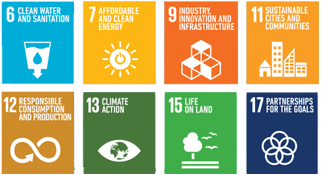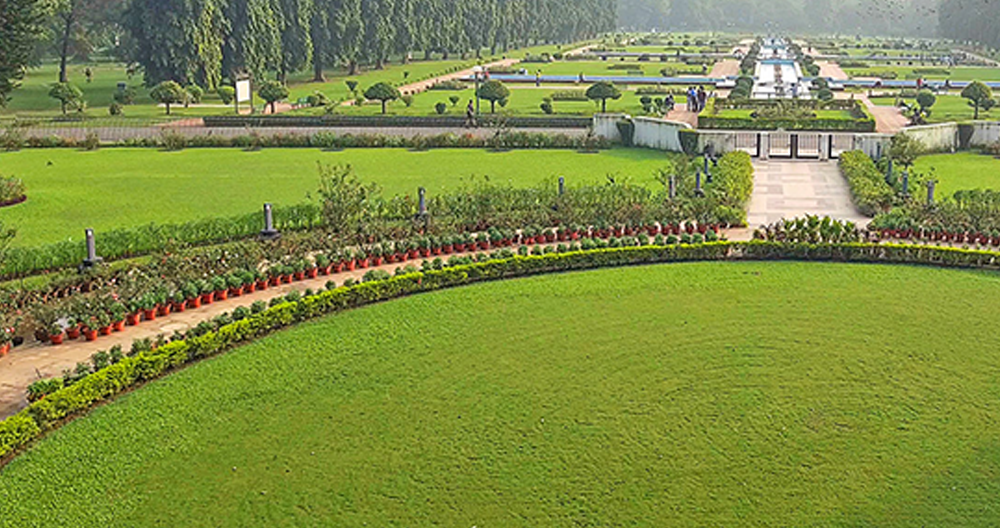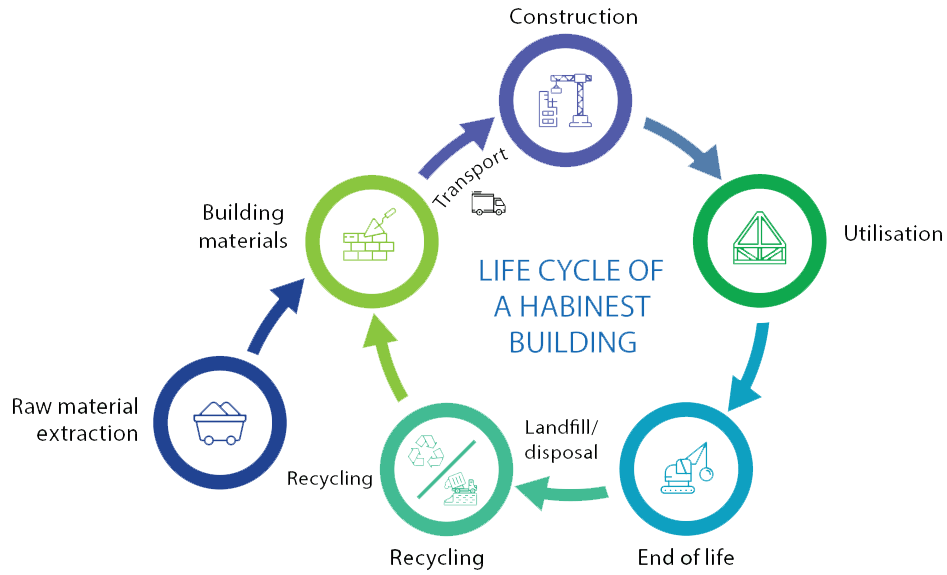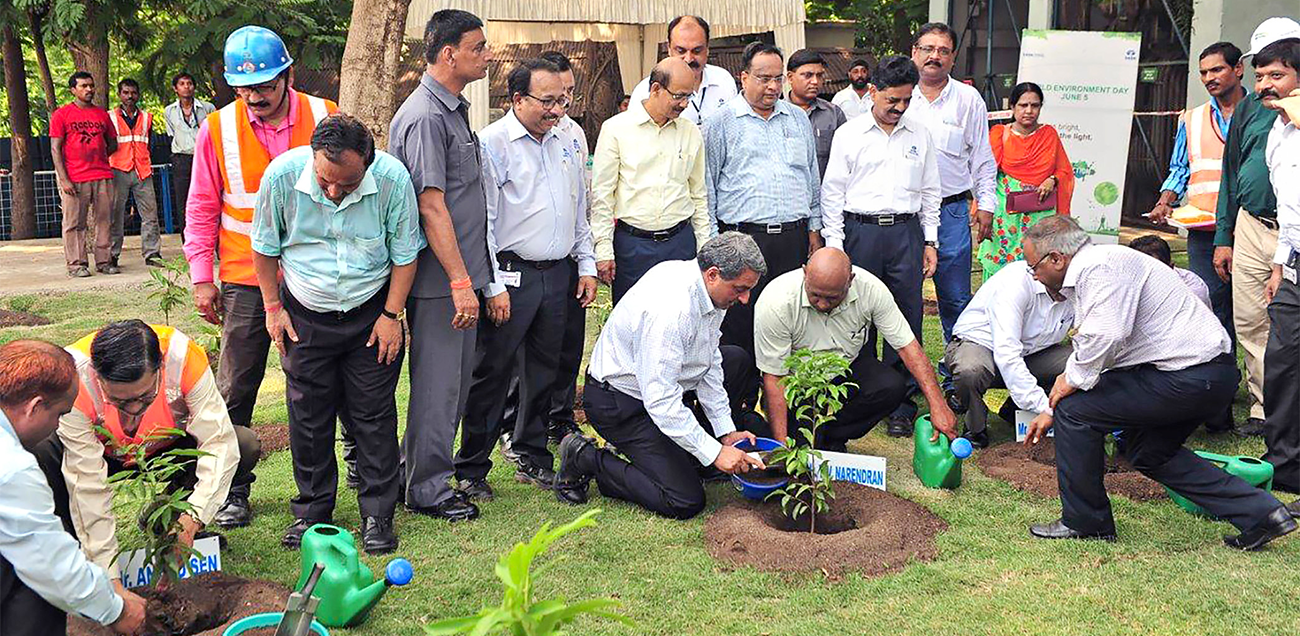 Natural capital
Natural capitalOptimising resources, investing for a sustainable future
Steel is integral for infrastructure building and plays a key role in economic development and nation-building. However, steelmaking is a resource-intensive process and creates environmental impact in form of emissions and effluents. We are committed to using the most efficient production routes, minimising waste generation and mitigating the negative impact on the environment.
Reduction in specific fresh water consumption since FY 2016-17
Reduction in stack dust emission intensity since FY 2016-17
(Leadership band) for Climate Change and Supply Chain disclosure in CDP 2020
Impact on SDGs

Ensuring sustainable practices with our Long Pipe Conveyor at West Bokaro, Jharkhand
Sure, we make steel.
But #WeAlsoMakeTomorrow
| 2025 Goals | 2030 Goals | |
|---|---|---|
|
Climate change |
Achieve CO2 emission intensity of <2 tCO2 /tcs for Tata Steel India |
Achieve CO2 emission intensity of <1.8 tCO2 /tcs for Tata Steel India |
|
Water |
Achieve specific freshwater consumption of 2 m3 /tcs across all steelmaking sites |
Achieve specific freshwater consumption of <1.5 m3/tcs across all steel making sites Aim for water neutrality |
|
Circular economy |
Achieve material efficiency of 99% at all steelmaking sites |
Sustain material efficiency at 100% at all steelmaking sites Increase IBMD EBITDA by 2.4 times over 2020 » Build recycling business in steel and other materials (>5 MnTPA) |
|
Biodiversity |
Develop and implement Biodiversity Management Plans (BMPs) for all operations sites (including raw material locations) |
Aspire for no net loss of biodiversity |
|
Dust emission |
Achieve specific dust emission intensity of 0.4 kg/tcs for Tata Steel India |
Achieve benchmark dust emission intensity by adopting best available technology |
|
Supply chain |
Coverage of 100% critical supply chain partners for ESG risk assessment and collaborate for risk mitigation |
Integrate ESG performance of partners in procurement decision-making |
|
Product sustainability |
Cover 100% of steelmaking and downstream sites under Life Cycle Assessment |
Disclose environment performance of 100% of products |
|
ResponsibleSteelTM certification |
Certification of all steelmaking sites |
- |
CO2 emission
Water consumption and effluent discharge
Waste management
Renewable and clean energy
Biodiversity
Energy efficiency
Air pollution
Circular economy
Supply chain sustainability
Our approach to managing natural capital is underpinned by our strategies on low carbon transition, reducing dependence on freshwater consumption, pollution control, maximising value from waste and exploring opportunities in the circular economy and enhancing biodiversity across the value chain.
We focus on operational excellence through our ‘Prevent, Minimise, Recover, Reuse and Recycle’ approach. We invest regularly to upgrade manufacturing and distribution facilities to improve operational and environmental performance. We have implemented environmental management systems in accordance with ISO 14001:2015, which provides the necessary framework for managing compliance and improving environmental performance. During FY 2020-21 `32.72 crore was invested on environmental management system upgradations focussed on improving air emissions, water management, imbibing circular economy principles and conservation of biodiversity. We operate state-of-the-art accredited laboratories for environmental performance assessment.

Air emissions
Clean air to breathe is a basic human right, and Tata Steel is committed to maintaining the quality of air in its operating areas.
We strive to reduce the negative impact of our operations on the quality of air through maintenance and upgradation of Air Pollution Control Equipment (APCE). We are conducting Source Apportionment studies of Jamshedpur Works and its surrounding areas within a radius of 20 kilometres to identify key sources of air pollution, their contribution to overall ambient air quality in the region, and accordingly develop air quality management plans. Our continuous efforts for reducing stack emission load has resulted in the reduction of dust emission intensity by 34% and 62% since FY 2016-17 at TSJ and TSK, respectively.


Life Cycle Assessment (LCA) is a method for assessing a product’s environmental impact considering its various life cycle stages.
We use LCA effectively to understand our products’ environmental impact as well as to use its outcome for product-related environmental disclosures. During FY 2020-21, a comparative LCA study was carried out between our HabiNest structure and a similar type of conventional structure. The study was carried out for a 2,400 square feet classroom building.

GHG management
GHG emissions from Indian steelmaking operations (million tCO2)
| Steelmaking Sites | Scope | FY17 | FY18 | FY19 | FY20 | FY21 |
|---|---|---|---|---|---|---|
|
Tata Steel Limited (TSJ+TSK) |
Scope 1 |
25.53 |
26.52 |
27.14 |
26.53 |
24.84 |
|
Scope 1.1 |
3.69 |
3.96 |
4.53 |
4.53 |
4.51 |
|
|
Scope 2 |
1.11 |
1.17 |
1.17 |
1.08 |
0.95 |
|
|
Scope 3 |
(2.21) |
(1.99) |
(1.81) |
(1.75) |
(1.98) |
|
|
Overall |
28.11 |
29.66 |
31.03 |
30.39 |
28.31 |
Emissions based on CO2 Data Collection User Guide V9.5, Worldsteel Association
We are committed to steering the business to low carbon pathways and prepare future-ready portfolio by building resilience for transition and physical climate change risks.
While we believe that steel is an integral part of the solution for transitioning to a low-carbon economy, we recognise the significant challenge which the steel sector is besieged with for deep decarbonisation. We are working on deployment of key enablers for deep decarbonisation, including the use of more scrap in steelmaking, use of alternate fuels such as natural gas and hydrogen, and deployment of carbon capture and storage/utilisation technologies. We continue to adopt the best available technologies for waste heat recovery such as Top Recovery Turbine (TRT), Coke Dry Quenching (CDQ), use of by-product gases in power generation and other energy efficiency measures, resulting in improvement of resource efficiency as well as reduction of carbon footprint.
We are actively engaging with technology companies, academia, companies from other sectors having similar challenges on development and scale-up of deep decarbonisation technologies such as CCUS, hydrogen generation and its use in steelmaking, use of biomass and other alternate ironmaking routes. Tata Steel has signed an agreement with Shell India Markets Private Limited to evaluate and co-develop short- and long-term options for improvement in energy efficiency, optimisation of demand around carbon-intensive products and services and others. Additionally, Tata Steel and the Council of Scientific & Industrial Research (CSIR) have signed an MoU to collaborate on CCUS.
We are a signatory to the Task Force on Climate-related Financial Disclosures (TCFD) for climate change and have identified transition risks and opportunities to decarbonise our operations in the long-term. Specific mitigation and contingency plans for each of the identified risks have been integrated within our long-term strategy. While the pandemic affected production marginally, Jamshedpur Steel Works remains the national benchmark in BF-BOF based integrated steel plants. Renewable energy projects with a combined potential of ~150 MW have been initiated based on a phase-wise roadmap across sites. Our engagements and support in leading initiatives such as Responsible Steel, Net Zero Steel Pathway methodology project, Assessment of Low-Carbon Transition (ACT), World Economic Forum’s Mining and Metal Blockchain Initiative and worldsteel's STEP-UP programme demonstrate our resolve towards long-term decarbonisation strategy.
Tata Steel Group was recognised by CDP in Leadership band (A-) for climate and supply chain disclosures.

Water management
Steel plants use a large amount of water for a variety of purposes, including cooling, dust suppression, cleaning, temperature control (heat treatment), and transport of waste materials (ash, sludge, and mill scale).
Our operations in India are located near rivers (Subarnarekha for Jamshedpur plant and Baitarani for Kalinganagar plant) which provides us a strategic advantage. Our efforts on water conservation hinge on minimising withdrawal of fresh water from rivers and maximising the recycling of treated effluents within the plants as well as domestic sewage. Specific fresh water consumption of TSJ (2.25 m3 /tcs in FY 2020-21, excluding drinking water consumption) is one of the lowest in the steel industry in India. In our pursuit to make Jamshedpur the first city in India to achieve zero sewage discharge into the river, two Sewage Treatment Plants (STPs) with capacity of 45 million litres per day (MLD) and 16 MLD have been installed in the city and treated water from the STPs is being reused in plant operations. During FY 2020-21, we successfully completed the CRM Bara Rejuvenation Project resulting in the creation of a larger rainwater harvesting facility, improvement in water table of local area and increase in biological diversity. Technological advances coupled with adoption of best practices, such as reusing of treated town sewage water for industrial purpose at Jamshedpur works, recycling of industrial effluent at all sites and recovery of storm runoff water at Kalinganagar works has enabled reduction of specific fresh water consumption by 41% and 46% at TSJ and TSK, respectively since FY 2016-17.

Biodiversity
Tata Steel has been actively working with several organisations to enhance its performance in biodiversity conservation and significantly reduce its impact on the ecosystem and biodiversity.
Our Indian operations are not located in any of the identified biodiversity hotspots or protected areas. During FY 2020-21, we developed BMPs for Jamshedpur and Kalinganagar, planted over 2.98 lakh saplings of native species across locations, developed a 12-hectare Ecological Importance Park on MSW Dumpsite at Jamshedpur and rejuvenated the 5.6 hectare CRM Bara Pond at Jamshedpur. By FY 2020-21, we have developed BMPs for 11 locations and plan to cover 100% of our sites by 2025.

Circular economy
Tata Steel endeavours to remain an industry benchmark in managing solid waste and creating value using 3R (Reduce, Reuse & Recycle) principles of the circular economy.
We handle about >12 MnTPA of by-products spanning 25+ product categories comprising 250+ Stock Keeping Units (SKUs). The wide range of industrial by-products serves as key raw materials to various industries such as cement, chemical, construction, among others. During FY 2020-21, we achieved process solid waste utilisation of >99% at TSJ and TSK, and focussed synergy initiatives have enabled knowledge transfer and horizontal deployment of best practices across our recently acquired facilities of TSBSL and TSLP.
By leveraging digital technologies, Tata Steel has created a resilient ecosystem for by-product management, which helped in successfully addressing the challenges posed by COVID-19. Agile and connected supply chain helped increase efficiency of material movement and ensure safer operations. The accelerated weathering facility for LD slag has enabled us to ramp up the utilisation of processed slag in the construction of national highways and downstream products such as soil conditioners, paver blocks, among others. During FY 2020-21, supplies of Ground Granulated Blast Furnace Slag (GGBS) started from Kalinganagar and has been successfully established in the market.
Tata Steel commenced operations of a future-ready by-product processing and value creation centre with modern baling units and mechanised processing facility in Jamshedpur. The Metal Recovery Plant (MRP) is now operational at Dhenkanal and Gamharia plants as well, helping to enhance internal consumption of by-products and offer value-added products for external markets.
Tata Steel won the prestigious CII 3R Awards 2020 at the CII International Conference for demonstrating the 3R (Reduce, Reuse, Recycle) principles in by-products management.
By 2030, we target to achieve material efficiency of 100% while sustaining solid waste utilisation of 100% across all locations and increasing EBITDA by 2.4 times from by-product business.
Steel has the unique property of being infinitely recyclable. Primarily, the Electric Arc Furnace (EAF) method for steelmaking, with lower carbon footprint, is used for re-melting of steel.
Higher usage of scrap for steelmaking in India is currently limited due to lower availability of scrap and a fragmented scrap supply chain. To be future-ready and establish the supply chain for scrap, we set up our steel recycling business in FY 2019-20. We successfully commissioned our first steel scrap recycling plant of 0.5 MnTPA in September 2020 at Rohtak, Haryana. It is a state-of-the-art plant with mechanised equipment such as shredder, baler, material handler for processing, handling and producing high-quality scrap. Steel scrap is procured from market segments such as End of Life Vehicle (ELV) scrap, obsolete household scrap, industrial scrap, etc. This scrap is processed through mechanised equipment and the high-quality processed scrap is supplied to electric arc furnaces (EAFs), induction furnaces (IFs) and foundries for downstream steelmaking. We have launched various first-of-its-kind initiatives in the global scrap industry such as branding of Scrap, FerroHaat app for buying and selling scrap, among others.
 Good if increases
Good if increases
 Good if decreases
Good if decreases
 TSJ
TSJ
 TSK
TSK

 TSJ
TSJ
 TSK
TSK

 TSJ
TSJ
 TSK
TSK

 TSJ
TSJ
 TSK
TSK

 TSJ
TSJ
 TSK
TSK

 TSJ
TSJ
 TSK
TSK
* Defined as freshwater consumption per tonne of crude steel produced excluding drinking water consumption
**Defined as amount of nitrogen oxides (in kilograms) emitted from stacks for producing one ton of crude steel
***Defined as amount of sulphur oxides (in kilograms) emitted from stacks for producing one ton of crude steel
****Defined as effluent discharged (in cubic metres) from operational premises for producing one ton of crude steel

Tata Steel regularly organises tree plantation drives across locations

 TSJ
TSJ
 TSK
TSK

 TSJ
TSJ
 TSK
TSK

In line with our strategic goal of being the industry leader in sustainability, we will continue investing in technologies and processes to further improve our performance on GHG emissions, water management, waste utilisation and biodiversity management. We are also accounting for possible regulatory, market and climate change in the future by continually evaluating risks and opportunities and adapting accordingly through various interventions such as expanding our steel recycling business, improving by-product business, carrying out life cycle assessments and embedding the principles of circular economy
* Defined as freshwater consumption per tonne of crude steel produced excluding drinking water consumption